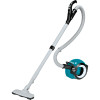Makita DCL501Z DCL501 Instruction Manual - Page 4
Save These, Instructions., Preparation
 |
View all Makita DCL501Z manuals
Add to My Manuals
Save this manual to your list of manuals |
Page 4 highlights
5. Under abusive conditions, liquid may be ejected from the battery; avoid contact. If contact accidentally occurs, flush with water. If liquid contacts eyes, additionally seek medical help. Liquid ejected from the battery may cause irritation or burns. 6. Do not use a battery cartridge or appliance that is damaged or modified. Damaged or modified batteries may exhibit unpredictable behavior resulting in fire, explosion or risk of injury. 7. Do not expose a battery cartridge or appliance to fire or excessive temperature. Exposure to fire or temperature above 130°C (265°F) may cause explosion. 8. Have servicing performed by a qualified repair person using only identical replacement parts. This will ensure that the safety of the product is maintained. 9. Before using battery cartridge, read all instructions and cautionary markings on (1) battery charger, (2) battery, and (3) product using battery. 10.Do not disassemble battery cartridge. 11.If operating time has become excessively shorter, stop operating immediately. It may result in a risk of overheating, possible burns and even an explosion. 12.If electrolyte gets into your eyes, rinse them out with clear water and seek medical attention right away. It may result in loss of your eyesight. 13.Do not short the battery cartridge: (1)Do not touch the terminals with any conductive material. (2)Avoid storing battery cartridge in a container with other metal objects such as nails, coins, etc. (3)Do not expose battery cartridge to water or rain. A battery short can cause a large current flow, overheating, possible burns and even a breakdown. 14.Do not store the appliance and battery cartridge in locations where the temperature may reach or exceed 50 °C (122 °F). 4 15.Do not incinerate the battery cartridge even if it is severely damaged or is completely worn out. The battery cartridge can explode in a fire. 16.Be careful not to drop or strike battery. 17.Do not use a damaged battery. 18.Follow your local regulations relating to disposal of battery. SAVE THESE INSTRUCTIONS. Tips for maintaining maximum battery life 1. Charge the battery cartridge before completely discharged. Always stop appliance operation and charge the battery cartridge when you notice less appliance power. 2. Never recharge a fully charged battery cartridge. Overcharging shortens the battery service life. 3. Charge the battery cartridge with room temperature at 10 °C - 40 °C (50 °F 104 °F). Let a hot battery cartridge cool down before charging it. 4. Charge the battery cartridge once in every six months if you do not use it for a long period of time. PREPARATION CAUTION: • Always be sure that the appliance is switched off and the battery cartridge is removed before adjusting or checking function on the appliance. Installing or removing battery cartridge 1. Red indicator 2. Button 3. Battery cartridge 3 2 1













